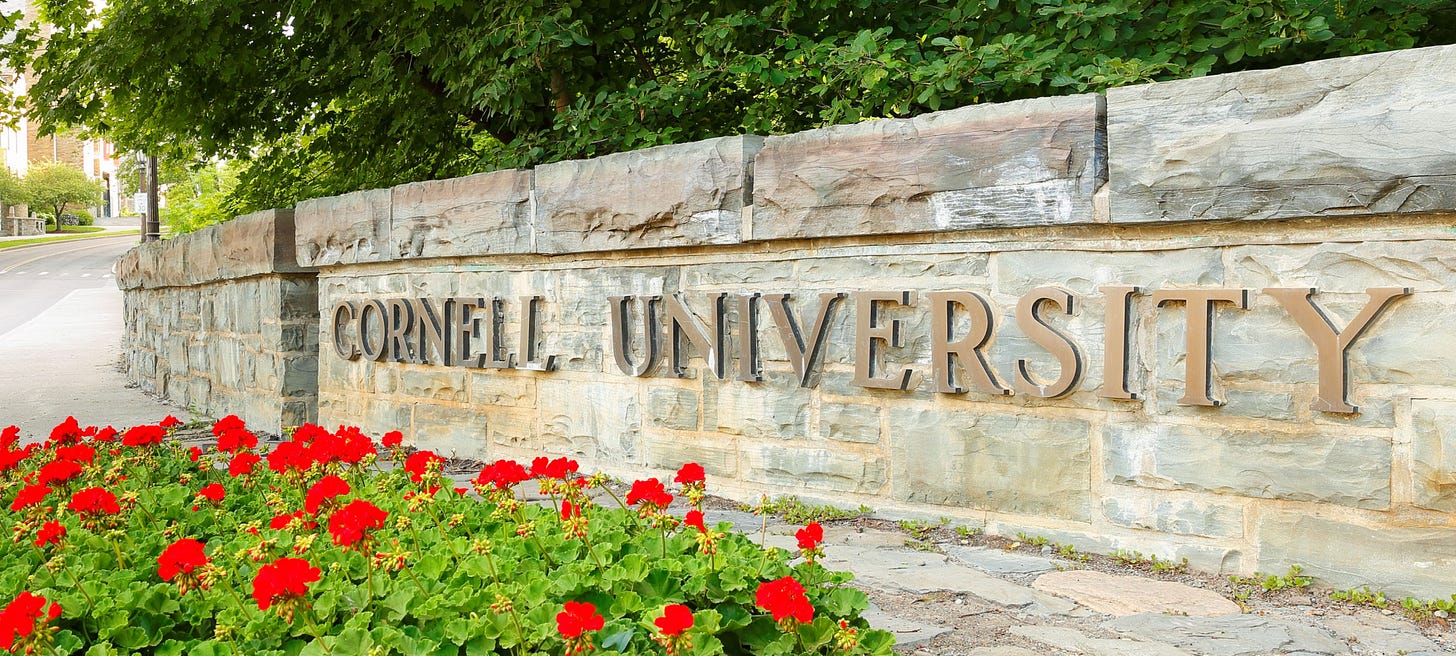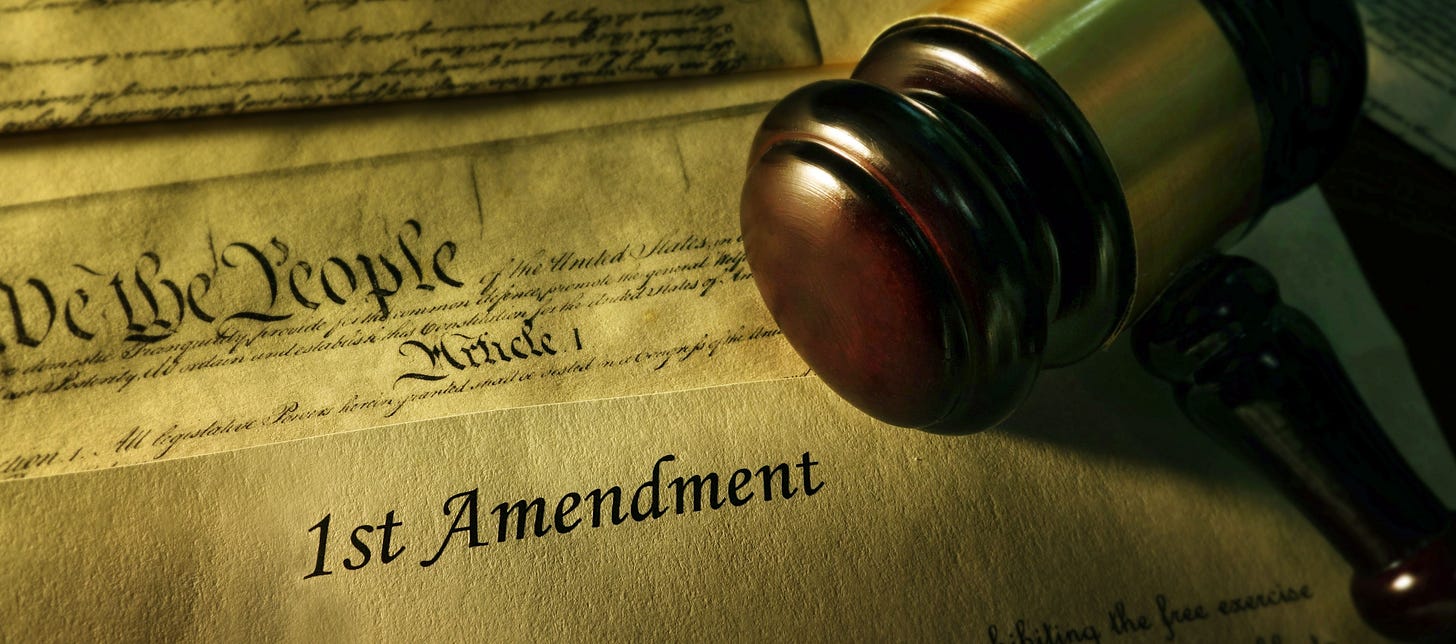E-Pluribus | April 6, 2023
Another university speaks out for academic freedom; free speech cuts both ways; and the state of the race state.
A round-up of the latest and best writing and musings on the rise of illiberalism in the public discourse:
Wall Street Journal Editorial Board: Cornell’s Academic Freedom Test
Are universities subject to peer pressure? If so, it might explain Cornell’s recent statements on the heels of the recent conflict at Stanford. The editorial board of the Wall Street Journal cheers Cornell’s refusal to coddle its students in a rejection of a student resolution demanding “trigger warnings” for course content.
“Learning to engage with difficult and challenging ideas is a core part of a university education: essential to our students’ intellectual growth, and to their future ability to lead and thrive in a diverse society,” Cornell President Martha Pollack and Provost Michael Kotlikoff wrote in rejecting the resolution. Academic freedom, they note, means that professors get to choose their course content as well as how they present it to their students.
In recent weeks, Stanford University and Columbia University have had to tangle with students who felt triggered by exposure to conservative judges. Stanford law students shouted down federal Judge Kyle Duncan while Columbia students have called on the university to take down a social media post that includes members of the school’s Federalist Society meeting with Supreme Court Justice Brett Kavanaugh. In both instances, the universities stood by policies protecting free expression on campus.
Cornell’s policy on free speech notes Cornell values “free and open inquiry and expression—tenets that underlie academic freedom—even of ideas some may consider wrong or offensive.” Research has shown that trigger warnings aren’t effective at helping people manage their anxiety, and including such warnings in an academic environment encourages emotional fragility and intellectual cowardice. It also teaches students and faculty to self-censor.
Read it all.
Conor Friedersdorf: Free Speech Is Not Just for Conservatives
Conservatives have often found themselves on the receiving end of campus restrictions, but Conor Friedersdorf writes at The Atlantic about the controversial decision by the president of West Texas A&M University in cancelling a drag show fundraiser. While many have rejected the president’s blackface comparison, Friedersdorf addresses the juxtaposition and the challenge it presents to both the Left and Right.
Can an administrator at a public university cancel a performance because he believes that it is degrading to women? That’s the position that Walter Wendler, the president of West Texas A&M University, took in a recent letter explaining why he was prohibiting a student group from going forward with an on-campus event raising money for charity.
“As a university president, I would not support ‘blackface’ performances on our campus, even if told the performance is a form of free speech or intended as humor. It is wrong,” he explained. “I do not support any show, performance or artistic expression which denigrates others—in this case, women—for any reason.”
The controversy could be understood as just the latest to pit free-speech rights against censors who argue that equity and inclusion can be more important. But there’s a wrinkle: The fundraising event in question was a drag performance planned by an LGBTQ campus group to benefit a nonprofit that works on suicide prevention.
That doesn’t change the First Amendment analysis––but an attempt to prohibit drag maps differently onto the culture wars. Wendler is trying to stop an event organized on behalf of a marginalized group using an argument that a faction of the left is willing to grant in principle: that equality requires deplatforming bigoted performances.
This episode serves as a reminder to progressives that expansive free-speech protections don’t just protect the rights of conservatives to say things on campus that you dislike; they protect the rights of students from historically marginalized and currently disfavored groups to express themselves in ways that conservatives hate and that many progressives regard as empowering.
Read it all here.
Joel Kotkin: Race and State
The issue of race has challenged the United States since its inception and even great strides made towards equality in the last half century have not brought all sides together. Joel Kotkin at Quillette discusses the history of race and the state as well as how most of what is proposed to “fix” disparities misses the point. Note: As a bonus, the article includes the word “cisheteropatriarchal.” So there’s that.
The notion that everything is the fault of “colonialism” and European oppression may secure university positions, but it does not benefit minorities in any meaningful way. Certainly, the attitudes inculcated by race activists are not helpful for meeting the challenges of modernity. It doesn't help a kid living in the ghetto that some academic “experts” denounce math as racist, despite its roots in places like India and the Arab world. One professor has even claimed that math is “a white, cisheteropatriarchal space.”
[ . . . ]
Rather than push a racial agenda, we could more effectively address disparities by addressing the needs of the multiracial working class. This will cover many minorities who already make up over 40 percent of the US working class and will constitute the majority by 2032. These workers face bigger problems than identity and reshaping history; they are focused on issues like inflation, rising crime, poor schools, and threats to their livelihoods posed by advances in AI and draconian green policies.
Ultimately, racial issues can be best addressed, in terms of policy and politics, by expanding opportunity and economic growth. It is economic opportunity that matters. What working-class minorities need is not more Maoist “struggle sessions” but pro-family and pro-growth policies that address the needs of the broad working class. Corporate mea culpas about racism, solidarity with Black Lives Matter, and expanding minority corporate board membership may blunt criticism (at least for a while), but won’t actually help most poorer minorities, who really need access to learning basic skills and economic opportunities. Blacks and other minorities, suggests former Citibank chairman Richard Parsons, will only feel better when they “feel it in their pockets.”
Read the whole piece.
Around Twitter
Alex Morey of the Foundation for Individual Rights & Expression comments on the “Stanford Effect” as highlighted in the Wall Street Journal editorial in item #1 above:
One of those “here’s what white supremacy culture looks like” tropes has reared its ugly head again, via Wesley Yang:
And finally, as our “Around Twitter” feature’s future possibly hangs in the balance, here’s an update on Elon Musk’s tampering with the legendary and oft-maligned Blue Checkmark:











